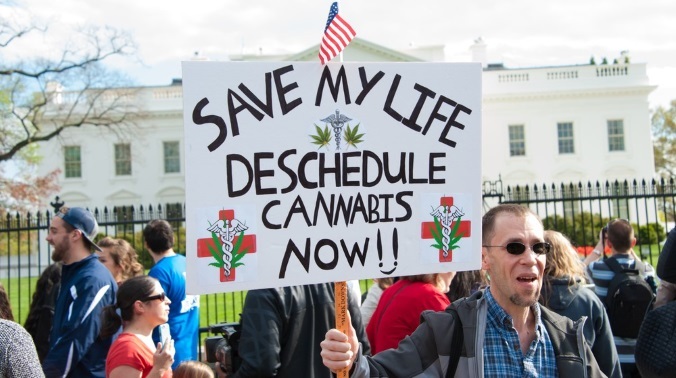In the latest wave of serious support for the legalization of marijuana, two prominent organizations just called for the federal descheduling of cannabis. For the National Conference of State Legislators (NCSL), which represents state lawmakers across the U.S, removing cannabis from the Controlled Substance Act needs to be done in order to respect the will of the people and the decision of individual states. The second group, the National Hispanic Caucus of State Legislators (NHCSL), believes laws against marijuana possession have unfairly targeted Latinos, and decriminalization is a matter of human rights and ending racism and discrimination. Seventy-seven percent of federal cannabis possession cases prosecuted last year involved Hispanics defendants, even though they make up only 17 percent of the population.
Although these two groups have different motivations, they are unified in their call for descheduling cannabis at the federal level, joining a chorus of voices from across the country. It’s a common cause that pits them squarely against the will of the Department of Justice.
The Battle Heats Up Over Vet’s Rights
In May of this year, the traditionally conservative American Legion — the largest organization representing war veterans in the United States — officially called upon the White House to reclassify cannabis to allow research and treatment for post-traumatic stress disorder (PTSD). PTSD affects up to 30 percent of the veteran population at some time in their life. In clinical studies, marijuana has been shown to profoundly reduce PTSD symptoms — and that makes it a miracle medicine for those with this hard-to-treat and life-damaging disorder.
After the letter from The American Legion was published publicly, Veterans Affairs Secretary David Shulkin told the press during a White House briefing that there is “compelling evidence” that marijuana can treat PTSD. He also decried the fact that the VA, a federal agency bound by federal law, is barred from providing cannabis prescriptions to vets even in states where medical MJ laws exist. This tension between patient and provider really boils down to a power struggle between national law and personal and states’ rights.
To illustrate this, despite the letter from the American Legion and the statement by Shulkin, Republican lawmakers in July removed a “Veterans Equal Access” amendment from the annual funding bill for the VA. The amendment, which was introduced by Democratic representatives, would have allowed VA doctors to prescribe medical marijuana to patients in states where it is legal.
Trump vs. The People of the United States
This is in line with the Trump administration’s continued opposition to the expansion of medical and recreational marijuana legalization. Attorney General Jeff Sessions, who has claimed that “good people don’t smoke marijuana,” has blocked the Drug Enforcement Administration (DEA) from responding to more than two dozen requests for medical marijuana research this year. He has also personally asked Congress to allow him to prosecute medical marijuana providers in states where it is legal by not renewing the Rohrabacher-Farr amendment, which has been in effect for three years and limits the federal government’s use of funding to interfere with states’ rights.
Fortunately, the Senate Appropriations Committee rebuffed Sessions and included the amendment again, noting particularly that the rider has bipartisan support in the Senate and that there was no persuasive reason to remove it.
This bipartisan support for medical marijuana was also on display in May when the Senate Caucus on International Narcotics Control, which is led by senators Dianne Feinstein (D-Calif.) and Chuck Grassley (R-Iowa), introduced a bill to advance research into cannabidiol (CBD) and other therapeutic marijuana compounds. The bill, titled the Cannabidiol Research Expansion Act, calls for several changes to federal law, including:
- legalizing possession of CBD for patients with epilepsy
- streamlining regulations for cannabis research
- creating a way for the FDA to regulate commercial marijuana products
- taking CBD off the Schedule I list of narcotic substances and designating it as Schedule II.
Now that both the National Conference of State Legislators and the National Hispanic Caucus of State Legislators have stepped into the ring in support of legalization, the executive branch finds itself surrounded by a diverse coalition of different interests and organizations all pushing for the same thing. In fact, even though Republicans tend to be against marijuana legalization, polls have found that they are also for (70 percent) leaving that decision up to the state and not the federal government, meaning the administration’s attempts to override state laws are not supported even by their own party’s constituents.
In response to the rhetoric from the White House and the threats to go after providers and patients even in states where it is legal, a new bipartisan and bicameral bill called the CAREERS Act has been introduced that would guarantee patients access to medical marijuana in states where it is legal without fear of federal prosecution. The CAREERS Act not only specifically protects states’ rights, but guarantees veterans access and expands research into therapeutic uses of marijuana.
With more than 30 states legalizing cannabis for medical use, this new bill ups the ante in the tug of war over marijuana legalization. The central government is acting in defiance of the will of the people, and there is bound to be a showdown someday soon.

